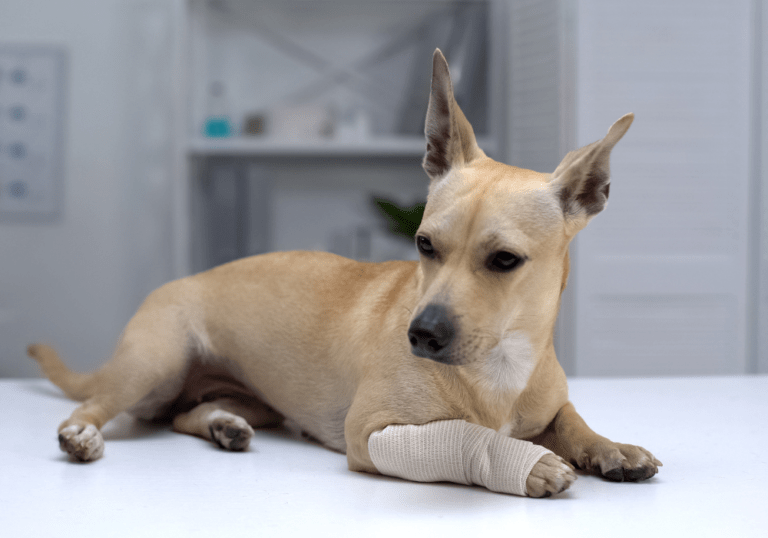First Aid Basics for Pet Owners: Essential Tips for Emergency Situations

As a pet owner, knowing how to handle emergencies can make all the difference in your pet’s health and wellbeing. With National Pet First Aid Awareness Month celebrated every April, it’s the perfect opportunity to refresh your first aid knowledge for common pet injuries. Whether you’re dealing with a minor cut or a more serious condition like heatstroke, having the right information can be invaluable.
Common Pet Injuries and How to Handle Them
1. Wounds
Minor cuts and scrapes can often be treated at home, but deeper lacerations, bite wounds, or cuts that won’t stop bleeding require immediate attention from a veterinarian. Here’s how to manage a minor wound:
- Rinse the wound with warm water to remove any debris.
- If the cut is bleeding, apply gentle pressure with a clean cloth or gauze for a few minutes.
- Once the bleeding stops, clean the wound with chlorhexidine or povidone-iodine.
- Apply a thin layer of antibiotic ointment and bandage the wound. You may need to trim your pet’s fur to ensure proper cleaning and bandaging.
2. Heatstroke
Pets can suffer from heatstroke, especially during hot and humid days. Look for the following signs:
- Panting
- Drooling
- Trouble breathing
- Unusual thirst
- Fever
- Glazed eyes
- Bright red gums
- Vomiting
- Confusion or collapse
If you suspect your pet is experiencing heatstroke, immediately bring them indoors and pour cool (not cold) water over them or apply cool towels. Offer them water, then take your pet to our doctors at Willow Glen Pet Hospital as soon as possible. Heatstroke is a medical emergency that requires prompt treatment.
3. Soft Tissue Injuries
If your dog seems sore after vigorous activity, they may have a bruise, strain, or sprain. Here’s how to provide first aid:
- Apply an ice pack or heating pad to the injured area, if your pet allows.
- Limit your pet’s activity for a day or two.
- If your pet is in pain, limping, or having difficulty moving, consult our doctors at Willow Glen Pet Hospital for further evaluation.
4. Broken Bones
While you can’t treat broken bones at home, you can help keep your pet comfortable before heading to the vet:
- Gently pick up your pet and place them in a pet carrier to minimize movement.
- If your pet is too injured for a carrier, create a makeshift stretcher using a board or other sturdy object.
- Splinting is usually unnecessary unless the limb is unstable. In such cases, use non-adhesive tape to secure the limb to a straight object.
5. Poisoning
If you suspect your pet has ingested something toxic, call our doctors at Willow Glen Pet Hospital or the ASPCA’s Animal Poison Control Center at (888) 426-4435 immediately. Do not attempt to induce vomiting or give activated charcoal without professional guidance, as these actions might worsen your pet’s condition.
Important Considerations
Protect Yourself
Injured pets may act unpredictably due to pain. Consider using a muzzle on dogs or wrapping a towel around cats to prevent bites. Ensure that the muzzle is not too tight and avoid it if you suspect a broken bone.
Don’t Remove Protruding Objects
If your pet has a foreign object embedded in their skin, such as glass or a stick, do not attempt to remove it. This could exacerbate bleeding or worsen the injury. Instead, let our veterinarians handle it safely.
Keep a First Aid Kit on Hand
Assemble a dedicated first aid kit for your pet that includes:
- Gauze
- Non-adhesive bandages
- Self-adherent wrap tape
- Cotton balls
- Activated charcoal
- Antibiotic ointment
- Iodine
- Scissors
- Styptic powder
- Ice packs
Prompt Veterinary Care is Essential
Whether your pet suffers from a cut, heatstroke, a sprain, or a broken bone, timely treatment is crucial. Don’t hesitate to contact us at Willow Glen Pet Hospital for assistance.
If you need more help or have any questions, call us at Willow Glen Pet Hospital, visit us online at willowglenpethospital.com, or reach us at (669) 342-7472. We’re located at 1033 Willow Street, San Jose, CA, 95125, US. Our hours are Monday to Saturday, 8:00 am – 6:00 pm.
By being prepared and knowledgeable about first aid for pets, you can be a lifesaver in an emergency.
